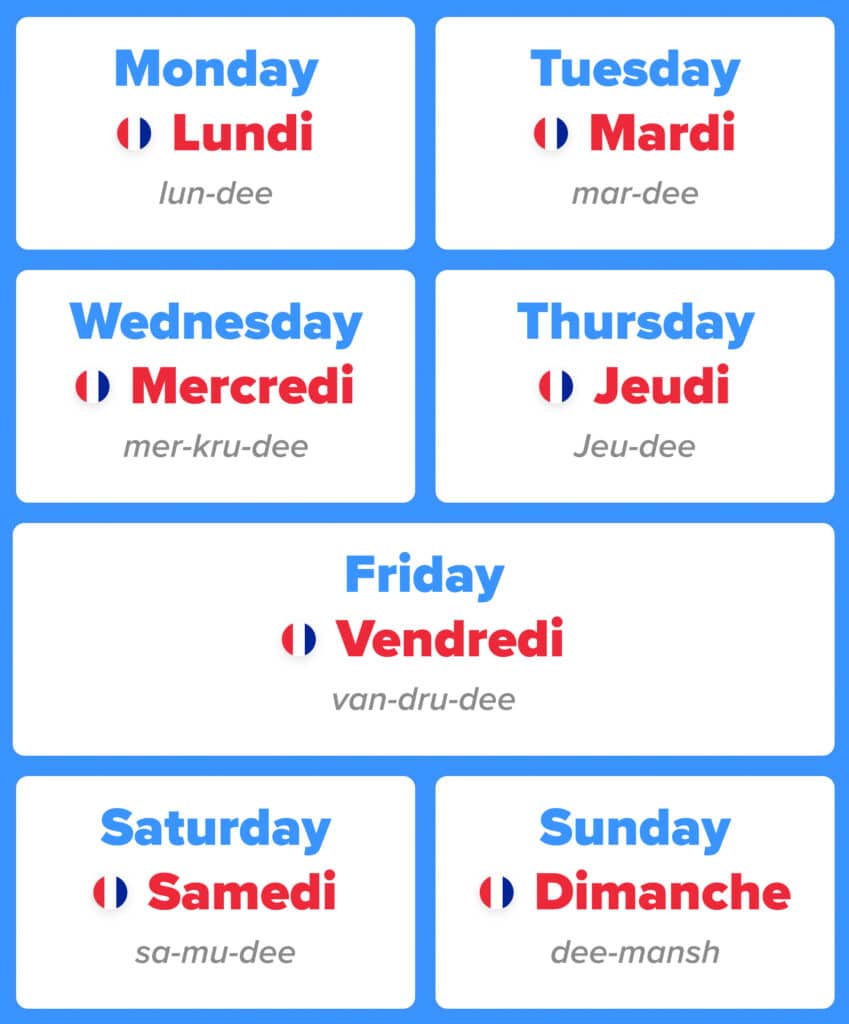
Days of the Week in French
Knowing the days of the week in French is a basic but super important skill.
After all, you don’t want to show up to your mardi doctor’s appointment on mercredi, do you?
So in this post, you’ll learn not only the days of the week and their origins, but also how to use them correctly as abbreviations, in their plural forms and more!
Contents
- What Are the French Days of the Week?
- Useful Vocabulary for Talking About Days of the Week
- How to Use Days of the Week in French
- And one more thing...
Download: This blog post is available as a convenient and portable PDF that you can take anywhere. Click here to get a copy. (Download)
What Are the French Days of the Week?
Knowing the days of the week in French will make talking about your day, weekly routines, weekend plans and many more conversational topics easier.
So we won’t just learn how to say each day; we’ll also look at how to use them as well as vocabulary related to them.
Without further ado, here are the days in French:
1. Lundi — Monday
Lundi is an easy one. The French word for moon is lune. Like in English, Monday (moon day) is devoted to the moon.
2. Mardi — Tuesday
Mardi is named for the Roman god of war, Mars.
But since Tuesday is named for the god Tyr in English, chances are this won’t help you too much—unless you’re particularly well-versed in Norse mythology.
Instead, remember the holiday Mardi Gras (“Fat Tuesday”), which many know given the famed celebration in New Orleans.
3. Mercredi — Wednesday
Mercredi is similar to mardi in its etymology: It’s the day of Mercury, the Roman god of financial gain, commerce and eloquence.
You could try to remember that Mercury—as the communicator between the mortals and the divine—is kind of halfway between worlds, just like mercredi is halfway through the workweek.
4. Jeudi — Thursday
Jeudi is once again named for a Roman god, this time Jupiter. In English, Thursday is named after Thor.
Another easy way to remember jeudi is to know the word jeux (play). Until 1972 in France, primary school students didn’t go to school on Thursdays. It was used as a day for play, or jeux. In 1972, this was switched out for Wednesday.
5. Vendredi — Friday
Vendredi is named after Venus, a Roman goddess.
If you know your Roman mythology, you might know that Venus is the goddess of love and beauty—nothing easier than remembering that Friday is all about love and beauty, right?
6. Samedi — Saturday
Samedi isn’t associated with a god, unlike in English, where Saturday is named for Saturn.
In French, samedi comes from the Latin sambati dies, which means “day of Sabbath.”
Even if you don’t know much Latin, you can remember that Sabbath and samedi start with the sound “sa,” and Saturday is the Sabbath day in the Jewish tradition.
7. Dimanche — Sunday
Dimanche is also not named for a Roman god, but rather from the Latin dies dominicus, meaning “the day of the Lord.”
Because Sunday is the day of the Sabbath in Christianity, this translation makes a lot of sense.
Useful Vocabulary for Talking About Days of the Week
Here are some more useful words and phrases for talking about the days of the week:
- Un jour — a day
- Une semaine — a week
- Hebdomadaire — weekly
- Les jours de la semaine — the days of the week
- Aujourd’hui — today
- Demain — tomorrow
- Hier — yesterday
- Avant-hier — the day before yesterday
- Après-demain — the day after tomorrow
- Le week-end — the weekend
- La fin de semaine — the weekend (québécois)
- Faire le pont — to have a long weekend (lit. “to make a bridge”)
Faire le pont refers to public holidays that fall on Tuesdays or Thursdays.
In France, it’s customary to (either officially or unofficially) transform these holidays into four-day weekends by taking the day off on the intervening Monday or Friday.
In doing so, you “bridge” the gap between the holiday and the weekend and get an extra day of R&R!
There are many words like this where the literal meaning might not make sense until you understand the influence French culture has on it.
FluentU takes authentic videos—like music videos, movie trailers, news and inspiring talks—and turns them into personalized language learning lessons.
You can try FluentU for free for 2 weeks. Check out the website or download the iOS app or Android app.
P.S. Click here to take advantage of our current sale! (Expires at the end of this month.)
How to Use Days of the Week in French
Capitalization
Capitalization is generally less common in French than in English. The days of the week are a good example of this, as you don’t capitalize these in French unless they are at the beginning of a sentence.
Thus, days of the week should be written as lundi, mardi, mercredi, jeudi, vendredi, samedi and dimanche.
Start of the French Week
In France, the week begins on Monday, or lundi.
This may be an adjustment if you’re used to starting from Sunday, but it may help to think of it as the day when school or work begins.
Gender
In French, all days of the week are masculine. When using the days of the week with an article, they will always take masculine articles.
C’est seulement un bricoleur du dimanche—vous devriez plutôt engager un professionnel. (He’s only a Sunday handyman—you should hire a professional instead.)
Using Prepositions
Unlike most French words that always require a preposition, days of the week usually don’t. For example: Mardi j’irai au supermarché (On Tuesday I will go to the supermarket) is the grammatically correct phrase.
When the article le precedes a day of the week, it is used to generalize every Monday, Tuesday, etc. So: Le mardi j’irai au supermarché (Every Tuesday I will go to the supermarket) has an entirely different meaning.
Pluralization
To pluralize days of the week, you simply use les instead of le and add an s to the end of whichever day you’re talking about. For example:
Le lundi → les lundis
Le mercredi → les mercredis
Le dimanche → les dimanches
Pluralizing days of the week is also another way of talking generally about them:
Les mardis je vais au supermarché. (On Tuesdays I go to the supermarket.)
Abbreviations
As is the case in English, you will often see the days of the week in French abbreviated in calendars, diaries, native French media and even online.
To abbreviate the days of the week in French, simply write the first three letters of the word:
Lun — lundi
Mar — mardi
Mer — mercredi
Jeu — jeudi
Ven — vendredi
Sam — samedi
Dim — dimanche
Just remember that practice makes perfect, and soon you’ll be using the French days of the week like a pro.
Download: This blog post is available as a convenient and portable PDF that you can take anywhere. Click here to get a copy. (Download)
And one more thing...
If you like learning French on your own time and from the comfort of your smart device, then I'd be remiss to not tell you about FluentU.
FluentU has a wide variety of great content, like interviews, documentary excerpts and web series, as you can see here:

FluentU brings native French videos with reach. With interactive captions, you can tap on any word to see an image, definition and useful examples.

For example, if you tap on the word "crois," you'll see this:

Practice and reinforce all the vocabulary you've learned in a given video with learn mode. Swipe left or right to see more examples for the word you’re learning, and play the mini-games found in our dynamic flashcards, like "fill in the blank."

All throughout, FluentU tracks the vocabulary that you’re learning and uses this information to give you a totally personalized experience. It gives you extra practice with difficult words—and reminds you when it’s time to review what you’ve learned.
Start using the FluentU website on your computer or tablet or, better yet, download the FluentU app from the iTunes or Google Play store. Click here to take advantage of our current sale! (Expires at the end of this month.)




